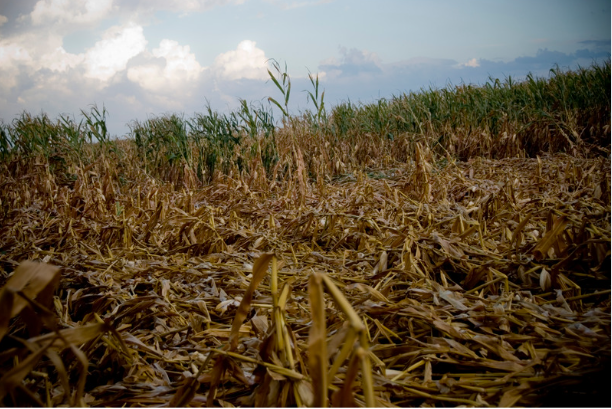Midwest Farmers Face Crisis as Winter Storm Elijah Devastates Agriculture
Des Moines, IA – The agriculture sector in the Midwest is currently experiencing a significant crisis as a result of Winter Storm Elijah. The storm has wreaked havoc on farmers, leading to considerable losses among crops and livestock. This disaster has compounded existing challenges for farming communities, which are already grappling with volatile market conditions and the adverse effects of climate change.
Severe Agricultural Damage
The aftermath of Winter Storm Elijah has left devastating evidence in its wake. Heavy snowfall and ice accumulation have severely damaged critical agricultural infrastructure. Greenhouses have collapsed under the weight of the snow, and storage facilities have suffered extensive damage, leaving many farmers with no safe place to store their remaining goods. Furthermore, thousands of acres of farmland have become unusable, rendering farmers unable to cultivate their crops. Livestock losses have also surged, with reports indicating that frigid temperatures and blocked access to feed are leading to decreased animal health and higher mortality rates. John Miller, a cattle farmer from Iowa, recently shared, “I’ve lost nearly half my herd. We weren’t prepared for anything this severe.”
Federal Assistance
In response to the agricultural crisis, the U.S. Department of Agriculture (USDA) has initiated emergency measures designed to support affected farmers. These measures include provisions for low-interest loans and disaster payments aimed at easing the financial burden on struggling farmers. While this assistance is welcome, many farmers are expressing concerns that it may not be sufficient to address the long-term impacts of the disaster. Sarah Nguyen, a soybean farmer from Indiana, commented on her worries: “We need long-term solutions, not just a Band-Aid.” This sentiment reflects a growing call within the farming community for a more comprehensive strategy that goes beyond immediate financial relief.
Consumer Impact
The ramifications of the losses experienced by Midwest farmers are not localized; they will reach consumers well beyond the affected regions. Agricultural economists are predicting that the turmoil in production will lead to elevated prices for essential food products, including meat, dairy, and grains, in the coming months. As supply chains are disrupted and production slows, both producers and consumers will face compounding challenges. Increased prices could strain household budgets and create additional pressures on already vulnerable populations.
Calls for Sustainable Solutions
In light of the extensive damage caused by Winter Storm Elijah, climate experts and advocates are sounding the alarm over the urgent need for investment in sustainable farming practices. They emphasize that these measures are essential to mitigate the risk of future disasters. Recommendations include enhancing infrastructure to withstand extreme weather events, transitioning toward resilient crop systems, and implementing better livestock management practices. These sustainable approaches are seen as vital to ensuring not only the recovery of the current crisis but also the long-term viability of the agricultural sector as it faces increasing climate unpredictability.
Looking Ahead
The ongoing recovery efforts for Midwest farmers underscore the critical vulnerabilities that the agricultural sector must address when facing extreme weather events. As communities begin to assess the damage and plan for recovery, it becomes apparent that long-term investments in sustainability and resilience will be crucial in safeguarding the nation’s food supply. The lessons learned from Winter Storm Elijah could inform policies and practices that enhance the capacity of farmers to adapt to a changing climate and the frequent emergencies it presents.
Conclusion
The devastation caused by Winter Storm Elijah presents a wake-up call for the agricultural community and policymakers alike. As farmers in the Midwest face the challenge of recovering from significant losses, it is imperative to consider not only immediate relief measures but also the adoption of long-term sustainable practices. By investing in infrastructure, resilient crop systems, and effective livestock management, the agriculture sector can better prepare for future challenges and safeguard its essential role in society.
FAQs
What are the main impacts of Winter Storm Elijah on Midwest agriculture?
The storm has resulted in extensive damage to crops and livestock, with destroyed greenhouses, damaged storage facilities, and thousands of unusable acres of farmland. Livestock losses have also been reported due to frigid temperatures and inaccessibility to feed supplies.
What kind of assistance is available for affected farmers?
The USDA has announced emergency measures featuring low-interest loans and disaster payments to help ease the financial burden on farmers impacted by the storm.
How might consumers be affected by this agricultural crisis?
Consumers are expected to face higher prices for meat, dairy, and grains in the coming months due to the supply chain disruptions and reduced production resulting from the storm’s impact on farmers.
What long-term solutions are being suggested for farmers?
Experts advocate for investments in sustainable farming practices, including improved infrastructure to withstand extreme weather, the adoption of resilient crop systems, and enhanced livestock management approaches.
Why is sustainability critical for the future of agriculture?
Sustainability is crucial as it helps mitigate risks associated with extreme weather, supports the long-term viability of farmland, and ensures the ongoing ability to produce food in a changing climate.

